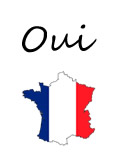Language/French/Vocabulary/Say-Yes
What are the differents ways to say "Yes" in French ? If you want to better understand and speak everyday French, you need to learn other ways than "Oui".
Oui
Yes
To say you agree in French, you can simply say "Yes" or you may repeat the whole sentence:
- Aimes tu les glaces ? oui / oui, j'aime les glaces. = Do you like icecream? Yes, I do
Ouais
Yep, Yeah
"Ouais" is the informal way of saying "yes" in French.
You'll hear this a lot in casual conversations:
- Tu habites à Paris ? Ouais, j'habite ici. = Do you live in Paris ? Yep, I live here.
Mouais...
Yeah, not that much
It's as casual as "ouais". It's saying "ouais" while showing little enthusiasm.
- Tu aimes les escargots ? Mouais, en fait, pas trop = Do you like snails. Yeah, in fact, not that much.
Mouais
Yeah, I don't believe you.
It's saying "ouais" while showing some serious doubt.
- Tu penses qu'il a rédigé ce texte tout seul ? Mouais... ça m'étonnerait = You think he wrote this text alone? Right... I doubt it.
Si
Yes
“Si” is what I like to call the contradiction yes. "Si" is a way to say yes, but we only use it to contradict someone who said a negative statement.
- Tu n'aimes pas la glace ? Si, au contraire ! = You don't like icecream ? Yes I do
D’accord
alright
- “D’accord” is the French equivalent of “alright”. = It's a short way of saying "Je suis d'accord" (I agree). Tu viens avec nous ? D'accord. Are you coming with us? Alright.
OK
alright
"Okay" has the same meaning as "D'accord" but a little less formal.
They can even be used together like this: "Ah! d'accord, okay"
Saying both, one after the other, is just a way to stress your agreement with what is being stated.
ça marche
alright
“ça marche” is a casual way to say “it’s ok for me” in French. You can use it with friends or family. You could also use the less common “ça roule” (lit: it rolls”) instead.
- Je passe te chercher à la sortie du lycée 17 heures mercredi. ça marche = I’ll pick you up at 7PM after school on Wednesday. Alright
Bien sûr
of course
If a person asks you something to which the answer seems obvious, you could answer:
- Bien sûr (of course)
- Evidemment (obviously)
You can use "bien sûr" in all situations, but "évidemment" is more formal.
- Tu aimes la glace ? Bien sûr ! = Do you like icecream? Of course!
Carrément
Sure
If you are really excited and wish to say yes without hesitation, you can use "carrément".
- ça te dirait de visiter les USA cet été ? Carrément ! = Would you like to visit the US this summer? Sure!
Mais oui
Yes
If someone asks you an irritating question, you can say "Mais oui" or "Ben oui". Warning: this can be considered as rude.
- Tu as rangé ta chambre ? Mais oui, je te l’ai déjà dit 4 fois = Did you tidy your room? Yes, I've already told you 4 times!
Volontiers
Yes, please
If you’re happy to do something, you can say "Volontier", politely. You can also use : - Avec plaisir - Certainement
- Vous désirez un café ? Volontier = Woud you care for a coffee? Yes, please
Exactement
exactly
When you want to confirm in a rather formal way that what someone says is correct, you can use:
- Exactement (exactly)
- Tout à fait (that’s right)
- En effet (indeed)
In a less formal way, you would say : "Exact !".
- Vous êtes bien Monsieur Durand ? Tout à fait = You are Monsieur Durand, right? That’s right
Parfait
Perfect
Sometimes, you may want to say that something is perfect. In this case, you can use:
Parfait, Très bien
- Votre chambre vous convient-elle ? oui, parfait ! = Your room suits you? Yes Thanks !
If you know other ways to say "Yes" in French, please edit this page ;-)

